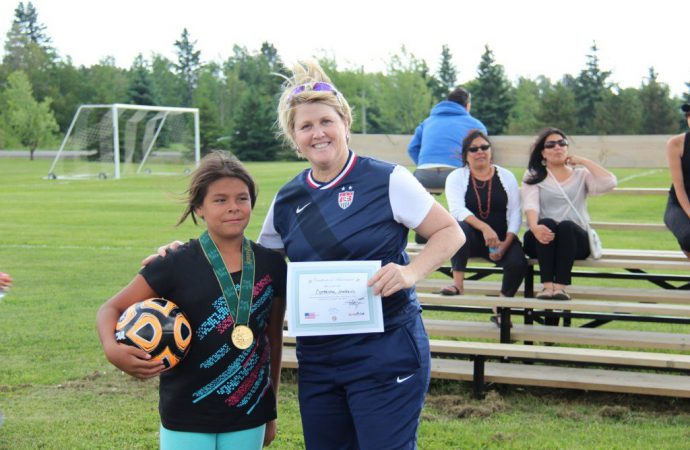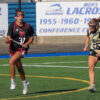The former US national goalkeeper, who formulated the human rights strategy for the United 2026 bid, becomes the centre’s inaugural chief executive
Whenever the awarding of a major sports event results in a large infrastructure project, allegations of human rights abuses seem to surface. During the early stages of its preparations to hosts the FIFA World Cup, Qatar was dogged by claims that migrant workers were living in appalling conditions, having their salaries delayed or not paid at all (an allegation backed up by a damning Amnesty International report in 2016).
A large-scale labour reform process adopted since has improved the situation, but there’s a recognition that keeping tabs on human rights during the whole event preparation process, throughout the whole supply chain, is incredibly challenging for sports organisations and organising committees.
Understanding the state of play, the Institute for Human Rights and Business (IHRB) established the Centre for Sport and Human Rights. And last week, during the organisation’s Sporting Chance Forum in Paris, it unveiled former US football international Mary Harvey as its inaugural chief executive.
Who is Mary Harvey?
Credited for devising and putting together the human rights strategy for the successful United 2026 bid (the US, Canada and Mexico’s bid to host the FIFA World Cup), Harvey appears to be the natural choice for the Centre for Sport and Human Rights.
The United 2026 strategy is based on United Nations Guiding Principles on Business and Human Rights, and was lauded for its detailed scale and scope. It commits the organising committee to obligations related to equality of opportunity and inclusivity, child safeguarding, freedom of expression, labour rights, land and housing rights, international travel and movement, privacy rights, and security.
Prior to developing the strategy, Harvey commissioned an independent investigation to identify gaps in human rights protections in the US, Mexico and Canada (see below).

And over the next two years, United 2026 will use a Candidate Host City scorecard – developed with the support of FIFA – to assess the human rights performance of all 23 host cities contenders before whittling the number down to a final 16.
Once the tournament concludes, the consequences of this strategy will be published in a Human Rights Report and will continue through human rights activities in host cities (see below). If all goes to plan, the strategy will leave a significant legacy in the host cities and will be the benchmark for sports events going forward.

Talking at a conference in May, Harvey told delegates about the United 2026 project, explaining her collaborative approach and discussing what sports event legacy looks like in the context of human rights.
“What was illuminating for me was inviting stakeholders who represent different areas of society, particularly those who are most vulnerable, and talking to them,” she said. “What does legacy look like for them? Not us, but for them. The people who are going to be living in the cities afterwards. And then I walked back from there.”
Anyone who has followed Harvey’s career will not be surprised by her significant contribution to the United 2026 success and subsequent appointment by the Centre of Sport and Human Rights. Ever since retiring from football in 1996 (winning the World Cup in 1991), the former goalkeeper has been an influential figure in the sport she loves.
During a five-year period she was the director of FIFA’s development division before taking the chief operating officer role of Women’s Professional Soccer in the US.
Most recently, Harvey has been overseeing the Green Sports Alliance, a professional body for sports organisations trying to make a positive environmental impact, as interim chief executive, although she has been on the board for more the five years.
What’s on her ‘to-do’ list?
Taking up the reins next month, Harvey will have a reasonably blank canvas to work with considering the Centre for Sport and Human Rights is only six months old. Although she’ll have the opportunity to shape the strategy and culture of the organisation, it does have a precise remit: to harness the resources and influence of major sports organisations to become “a uniting force for good in society”.
Indeed, while the centre is newly-established, the IHRB has been involved in sport and human rights since the 2012 Olympic Games in London when it supported the Games’ Sustainability Commission. The institute has since published several whitepapers on sport and human rights for sports governing bodies, host cities/nations, sponsors and broadcasters, and affected groups.
A framework for the Centre for Sport and Human Rights has been developed to articulate its scope of work, which can be broken down into three parts: sharing knowledge (though dialogues and resources), building capacity (with training and workshops) and increasing accountability.
The latter point will be crucial if the organisation is really to make a difference. Harvey built accountability into the United 2026 strategy by implementing the scorecard system for potential host cities. If that can be replicated and expanded, so that human rights offences are properly dealt with and that victims have access to appropriate reporting and grievance channels, the Centre for Sport and Human Rights (and its 40 advisory council members – see below) could catalyse significant change.
Centre for Sport and Human Rights Advisory Council











Leave a Comment
Your email address will not be published. Required fields are marked with *